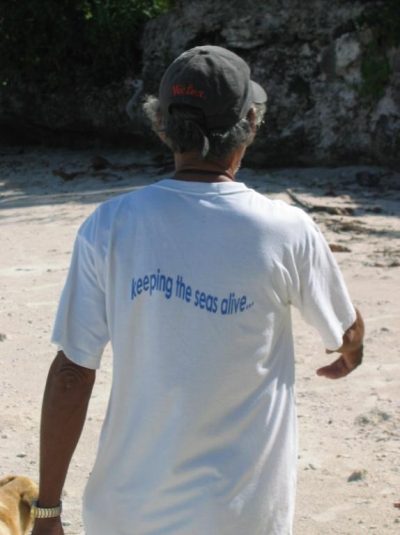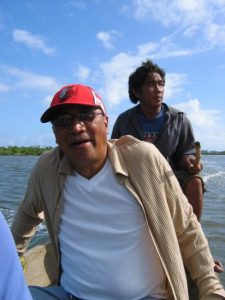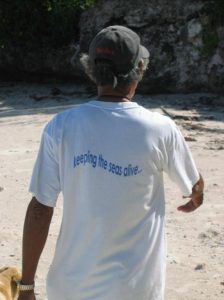Stories from the Philippines

Volunteer Advisor Jim Ross has been doing CESO assignments in aquaculture, watershed management and environmental protection since 2003. Here, he reflects on two outstanding local connections he made while on assignment in the Philippines.
Jofel
I met Jofel in Buguey, the Philippines in 2009. Jofel was held in high regard in the area. He had worked in the US for eleven years before returning to the Philippines. I asked him if he had retired. No, he explained, he had just tired.
Prior to his venture in the States, Jofel had been a councillor for the Municipality of Buguey, but he had no interest in re-establishing his political career. He felt that he could do more good for the community as a private citizen. To this end, he established a small private micro-loan business that catered to the locals.
Jofel’s family owned fishponds upriver from the Buguey Bridge on a channel off the main river. The land had belonged to his father who was one of the original fishpond farmers in the area. His father had owned 1500 hectares of land in the area, most of which was covered by dense mangrove shrubs. In those early days, his father and mother dug their fishponds by hand. They also dug the channel from the river to bring in brackish water in which to grow their fish and prawns. Initially they had planned on bringing water directly by pipe from the North China Sea, but this idea proved too expensive. Over the years, they sold off about half of their holdings. Jofel had farmed fish on the remaining 800 hectares until he left for the States.
Jofel was deeply interested in the betterment of his community and in improving the environment of the lagoon that bore its name. He told me that, in previous times, the lagoon had been healthy and provided well for the fish farmers of the area. Now, it was in failing health, due, he thought, in large part to a series of sluice gates limiting flow from feeder creeks. He believed that these gates had changed the ecology of the lagoon over the past 20 years. The cost was a loss of many jobs, and an almost complete eradication of the locals’ way of life.
Jofel hopes that somehow they will eventually manage to restore the salt water regime of the lagoon, and he can once again enjoy farming fish and watching the lagoon flourish.


Victor is well into his 70’s, and he has spent his whole life as a marginal fisher in the Barangay of Bil-isan on Panglao Island in the Philippines. Most evenings he launches his little pump boat from the beach and heads about a kilometre offshore. There he spends the night handlining with a light hanging from the bow of his boat to attract fish.
I came to Bil-isan on a CESO assignment by request of the Bohol Marine Triangle to conduct a study on the sustainability of the Marine Protected Areas. This matter is of great concern to the local fishermen who depend on the marine ecosystem for sustenance. The coral reef suffers from the past practices of overfishing, dynamite fishing and impacts from boat anchors. Now coral bleaching, an effect of climate change, has ravaged the reef. The local Bil-isan Fisherfolk Association has taken on biological monitoring of the area. Silliman University has provided them with instruction in monitoring techniques and identification. The Association has very little gear, but they make up for it with enthusiasm and dedication.
Victor is President of the Fisherfolk Association, as well as Chair of the Bil-isan Marine Protected Area Committee and a member of the Bohol Marine Triangle Management Council. When the fishing is no good, or when his motor breaks, he heads to the guardhouse that overlooks his beloved Marine Protected Area. There he sits all night to ensure that no one poaches from the preserve. He sees this as important work.
On the day set aside for us to visit the Bil-isan site, Victor took my wife Linda and I to the Barangay office to introduce us to the Barangay officials. Then it was off to the reefs. Victor had the most ancient pair of swim goggles I have ever seen, held together with fishing line. As we snorkelled over the reef, Victor would occasionally stop to identify something of interest, or to explain the relevance of some little critter to me. Victor’s formal education is minimal, but his depth and breadth of knowledge is enormous.
Victor once told me that he sometimes gets grief from his wife when he heads out to work on the Marine Protected Area. I asked him what he tells her.
“My Love”, he tells her, “I am doing this for our grandchildren”.
We were so impressed by Victor’s commitment, understanding, and global perspective, that I gave him my mask and snorkel when we left. I also dedicated my report to him, reflecting Victor’s dedication to his dream that is creating a legacy.
Donate Today
Your donation helps connect businesses, governments and community organizations with the skills and support to achieve their goals and contribute to inclusive growth. When you give to Catalyste+, you empower women and drive progress in harmony with nature. You’re helping people get what they need to improve their lives and build strong communities.